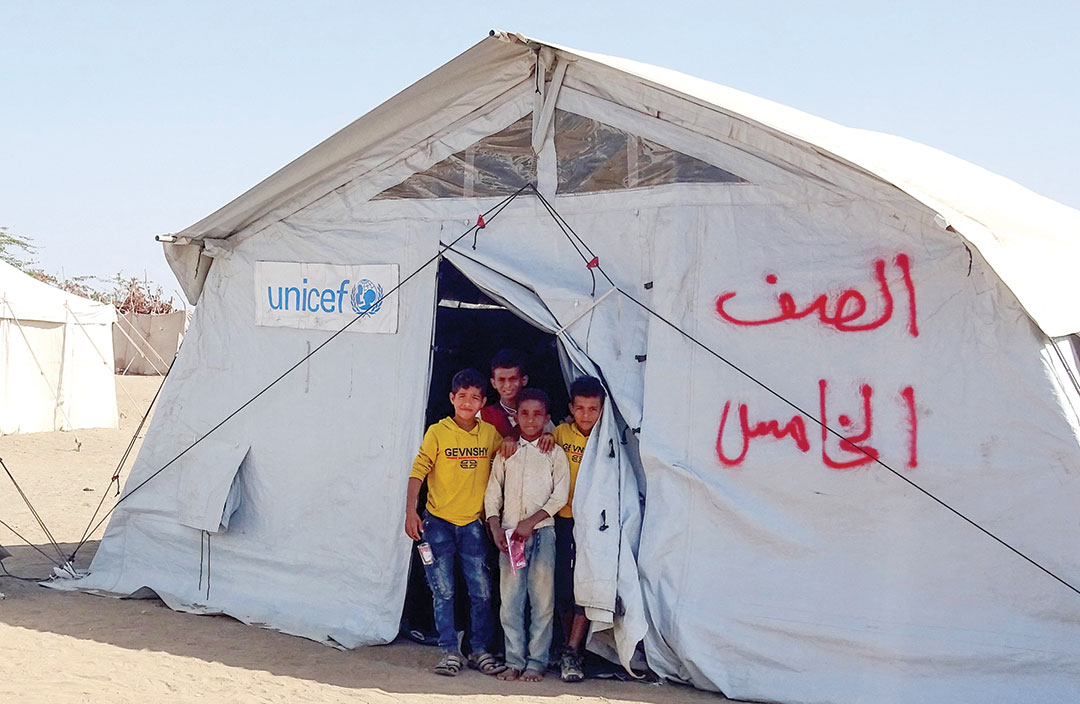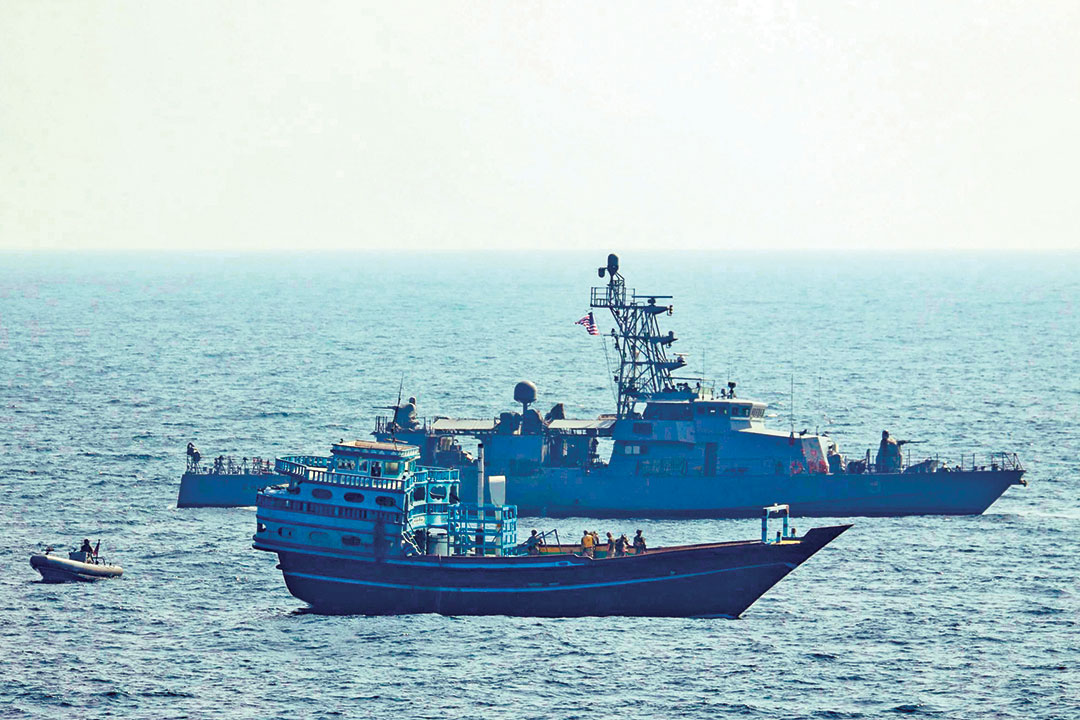DR. AHMAD AWAD BIN MUBARAK, MINISTER OF FOREIGN AFFAIRS, YEMEN
The war in Yemen has surpassed its seventh year since the Houthi militia launched it against the Yemeni people following the coup against legitimate authority. This war is dangerous not only because the Houthi militia is trying to seize power, but it is also seeking to change the nature of Yemeni society, to derail its future and that of the region by recruiting children on a large scale and indoctrinating young people to incite violence, perpetrate conflict and spread hatred between inhabitants of the same country. In addition, the Houthis are trying to spread ignorance in the community to make it easier to control, and they are working to impoverish Yemenis and exploit them to recuit them in wars. All of this provided a fertile environment for making Yemen one of the pillars of Iran’s expansionist strategy in the region.
The Iranian project is now clear. Its militias are surrounding the Arabian Peninsula. Armed with qualitative military capabilities, the danger has widened. There is no doubt that the failure of the Iranian project in Yemen will ensure the failure of the Iranian project in the entire region. Its success in Yemen will usher in a new phase of conflict and lead to another cycle of violence and chaos. I will try to clarify where we stand today and what our vision is for achieving peace in Yemen.
At this stage of the war, the Marib governorate is the focus of those who follow the Yemeni issue. Since November 2020, the Houthi militia has launched a continuous attack against Marib. Such an attack is driven by grudges that are no less detrimental than the illusion that the militia can seize the governorate and the greater illusion of controlling Yemen with violence, terrorism and military force.
The Marib governorate, with its historic importance, has gained national and strategic importance. Many might have forgotten that this governorate defeated the Houthis in 2015 with modest combat capabilities compared to what it has today, with a population of no more than 350,000 people. It is more capable today. It has become a haven for Yemenis of various social and political affiliations, with a population of 4 million people, among which 2 million are internally displaced people. This population is supportive of an Army having a national creed and a firm and unbreakable will to end the Houthi project.

Despite this, it is necessary to point out that some stakeholders have miscalculated by starting to talk about a post-Marib scenario. If we discuss a scenario that is unrealistic for us, we will undoubtedly say that if the Houthis control Marib, it will be as bad as when its historically famous dam was destroyed. Today, Marib is the impenetrable wall for Yemen. It has become one of the strategic priorities of the Iranian regime. The fall of Marib would not only lead to a horrific humanitarian situation, but it would also mark the end of the political and peace process in Yemen. It would put an end to efforts to restore security and stability. Chaos would prevail; more violence, internal strife and waves of migration would follow. It would be the beginning of a lasting state of instability that might lead to other wars being waged from Yemen toward the rest of the region.
Our vision and approach in the Yemeni government is the following: There is no alternative to peace in Yemen. Any just, comprehensive and sustainable peace must address the political roots of the war, represented by the attempt by the Houthi militia to impose its control and hegemony by force on Yemen.
Despite the destructive Iranian intervention in Yemen, despite its military support for the Houthi militia and its financing of its war machine, treating the war in Yemen as a regional proxy war is a misconception that should be corrected. No peace settlement in Yemen can be successful without Yemenis agreeing to solve their internal problems in accordance with the outcomes of the Comprehensive National Dialogue Conference and the equitable distribution of power and wealth.
However, at the same time, it would be wrong to neglect the geostrategic dimension of Iranian interference in Yemen and Iran’s desire to get closer to the Red Sea and the Arabian Sea. Such a thing will give Iran strategic added value in the conflict and will increase regional and international competition.
Iranian investment in the Houthi movement started early and increased at the beginning of the second millennium. The U.S. Navy’s seizure of Iranian ships Jihan 1 and Jihan 2 on their way to the Houthis with weapons and missiles several years before the war proves that. It enables us, in fact, to debunk the claim that the current war is the reason behind the Iranian intervention in Yemen.
Among the misconceptions we can also mention that Houthis reject peace whenever they advance militarily. In fact, they reject peace as a strategic principle whether they are advancing or retreating militarily, and they deal with peace as a tactic within their military strategy. We have dozens of pieces of evidence about that. The clearest is probably the Stockholm Agreement, which the Houthi militia accepted in December 2018 without implementing any of the provisions.
Understanding this helps us understand the appropriate approach to achieving peace with a group that does not base its calculations on facts, but rather on a theocratic thought based on the illusion of claiming the divine right to rule. This is the most daunting obstacle that has thwarted agreements in all peace rounds, from Geneva to Kuwait and even Stockholm. If we take into account this clear fact, we can say that the most important test for the Houthi militia — a test that it constantly rejects — is accepting a comprehensive cease-fire as the most important humanitarian step. All other humanitarian issues can be addressed before going to negotiations to find a comprehensive political solution.

We believe that the cohesion and unity of all moderate political powers opposing the Iranian project in Yemen is the first requirement toward a political settlement. The Riyadh Agreement could be completed and implemented, in addition to the security and military annex, because they constitute an essential pillar for achieving peace, security and stability.
The regional and international support for the Yemeni government in overcoming its economic challenges and strengthening political, economic and humanitarian partnerships will enable the government to maintain a moderate Yemen that shares with the world common humanitarian values and principles. We know the importance of continued efforts among countries of the region and the world to pressure Iran to stop its subversive activities in Yemen, so that the Middle East enjoys security, peace and stability.
Achieving peace in our country is enough to curb the militias and to address the problems and issues they have caused in Yemeni society. This is why we need to deal flexibly with all endeavors aimed at achieving peace in line with our national principles, the Gulf Cooperation Council initiative and its executive mechanism, the outcomes of the Comprehensive National Dialogue Conference and United Nations Security Council Resolution 2216, to achieve a comprehensive, just and lasting peace to restore security and stability in Yemen.
In conclusion, I will reference the catastrophic environmental danger that everyone is expecting without, in fact, making any real effort to avoid it: The leakage of more than 1 million barrels of crude oil stored for seven years in the oil tanker Safer is a real disaster that will destroy the marine environment of Yemen and the region, especially the Red Sea and the Red Sea areas. The Houthis are still holding the tanker hostage. They are refusing to allow the United Nations team to maintain it.
This is a slightly abridged version of a speech given at the 17th Regional Security Summit in Bahrain in November 2021 as part of the Manama Dialogue.

